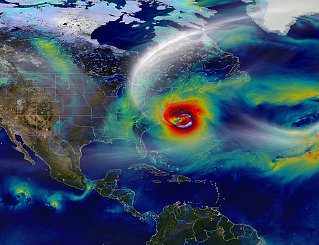Critical Incident Management: A Career With Impact
Saint Leo University's online degree program in critical incident management prepares professionals for this in-demand field.

Saint Leo University's online degree program in critical incident management prepares professionals for this in-demand field.

Critical incident managers think about the things that the average person does not.
Before any big event occurs, local law enforcement, along with other government agencies, has spent weeks, if not months, preparing for the show to go on.
They discuss:
After a natural disaster, critical incident managers organize the disaster response and recovery efforts.
They may coordinate first responders, evaluate damages, ensure survivors are safe and injured individuals receive medical attention, organize distribution centers for food and water, coordinate temporary shelters for people displaced, and work with communications professionals to spread the word about assistance available.
Critical incident management also is involved when homicides (such as a mass shooting at workplace or school), acts of terror, or security breaches occur.
According to Brian McNulty, captain of Florida's Haines City Police Department and graduate of Saint Leo University's online master's in criminal justice with a specialization in critical incident management, critical incident management impacts a lot of fields—from security for hospitals and operations of large-scale buildings such as hotels to emergency responders and health care centers that deal with huge casualty incidents.
In addition, professionals in the insurance industry deal with risk assessment and management, which is related to critical incident management. Law enforcement and local, state, and federal emergency management organizations also prepare for and respond to critical incidents.
And critical incidents—large and small—happen every day.
"If I turned on three different TV channels, I could find a critical incident on each one," McNulty says, citing a West Virginia mine collapse that had occurred that day as an example.
What does this all mean for careers in critical incident management?
A strong job outlook in a wide variety of fields. Critical incident management professionals may work for hospitals, universities, private companies, law enforcement agencies, or government agencies.
For example:
Another example: The FBI's Critical Incident Response Group (CIRG) facilitates rapid response to and management of crisis incidents. CIRG employs professionals to provide aviation and surveillance to support FBI investigative activities, to monitor strategic information and operations, and to provide technical support to law enforcement partners to integrate operational responses.
According to the U.S. Bureau of Labor Statistics (BLS), the demand for emergency management directors and specialists is expected to grow through 2022. The BLS attributes this anticipated growth to changes in weather patterns that make more areas vulnerable to weather emergencies and a need to help businesses and organizations (such as schools, hospitals, and private companies) continue to provide products and services during and after emergencies.
The highest job growth is expected in the private sector, while jobs in local, state, and federal emergency management may be impacted by government budgets.
Saint Leo University offers two programs for students interested in critical incident management careers: an online master's in criminal justice with a specialization in critical incident management and an online master's in critical incident management. The programs provide students the necessary theoretical knowledge and practical skills to identify threats, minimize risk, and lead organizations in times of crisis.
McNulty believes that investing in the formal study of critical incident management and diligently preparing for critical incidents, inevitably, can make a disastrous ordeal manageable.
"It's is a proactive approach to a reactive situation," he says. "The events are going to happen; the question is how well prepared we are for them and how well we respond."
Can we answer any questions you might have about preparing for a career in critical incidence management?
Image Credit: NASA GSFC/William Putnam on Flickr
Other posts you may be interested in reading:
Preparing For The Unpredictable
Starting A Career In Critical Incident Management